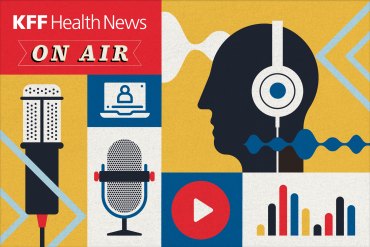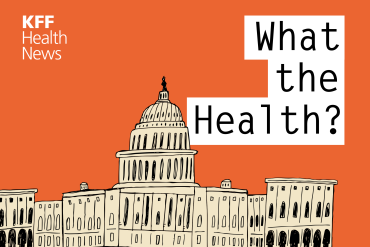Trump’s White House Return Poised To Tangle Health Care Safety Net
The new Trump administration is likely to reduce subsidies for Affordable Care Act insurance plans and roll back Medicaid coverage. Public health authorities worry that anti-vaccine activist Robert F. Kennedy Jr. will be empowered.
Community Health Workers Spread Across the US, Even in Rural Areas
Community health workers are increasingly common in rural areas, where they help patients overcome barriers to accessing care and staying healthy.
Trabajadores de salud comunitarios ayudan a mejorar la salud de habitantes de zonas rurales
Se ha comprobado que estas iniciativas mejoran la salud de las personas y el acceso a la atención preventiva, al tiempo que reducen las costosas visitas al hospital
What’s at Stake: A Pivotal Election for Six Big Health Issues
Health care has ebbed and surged as an election issue throughout the presidential campaign. Here are the ways some of the most consequential changes in health policies could hinge on whether Vice President Kamala Harris or former President Donald Trump wins.
Paid Sick Leave Is Up for a Vote in Three States
The coronavirus pandemic underscored the importance of paid sick leave, a benefit to help workers and their families when they fall ill. Now voters in Missouri, Nebraska, and Alaska are deciding whether employers must provide it.
Can a $10 Billion Climate Bond Address California’s Water Contamination Problem?
California voters will decide in November whether to approve a $10 billion climate bond that supporters say is needed to jump-start water system repairs for residents without safe drinking water. Opponents say those repairs should be prioritized in the state budget, not put on a credit card.
For People With Opioid Addiction, Medicaid ‘Unwinding’ Raises the Stakes
Medications such as methadone can cut the risk of a fatal opioid overdose in half. Medicaid covers the medication. But as state Medicaid programs reevaluated coverage of each enrollee following a pause in disenrollments during the covid-19 pandemic, some patients lost a crucial pillar of their sobriety.
Black Americans Still Suffer Worse Health. Here’s Why There’s So Little Progress.
The United States has made almost no progress in closing racial health disparities despite promises, research shows. The government, some critics argue, is often the underlying culprit.
How a Proposed Federal Heat Rule Might Have Saved These Workers’ Lives
Laborers have suffered in extreme heat triggered by climate change. Deaths aren’t inevitable, researchers say: Employers can save lives by providing ample water and breaks.
Los trabajadores están sufriendo, y muriendo, cada vez más, a medida que los veranos se vuelven progresivamente más calurosos debido al cambio climático.
Exclusive: Emails Reveal How Health Departments Struggle To Track Human Cases of Bird Flu
Emails show how health officials struggle to track the bird flu, partly in deference to the agricultural industry. As a result, researchers don’t know how often farmworkers are being infected — and could miss alarming signals.
Crackdown on Homeless Encampments Raises Public Health Questions
As states turn to the health-care system to help address homelessness, experiments with housing and other social services aimed at getting people healthier and off the streets are running up against new, aggressive crackdowns — with some cities ratcheting up enforcement of existing anticamping laws and others passing new restrictions. From Florida to California, elected […]
Watch: ‘Silence in Sikeston & The Effects of Racial Violence’
KFF Health News Midwest correspondent Cara Anthony talks about how racism affects health on Nine PBS’ “Listen, St. Louis with Carol Daniel,” stemming from her reporting for the “Silence in Sikeston” multimedia project, on the impact of a 1942 lynching and a 2020 police killing on a rural Missouri community.
Journalists Address Opioid Settlements, Undiagnosed ADHD, and a Georgia Chemical Fire
KFF Health News and California Healthline staff made the rounds on national and local media in the last two weeks to discuss topical stories. Here’s a collection of their appearances.
Mountain Town Confronts an Unexpected Public Health Catastrophe
Flooding wrought by Hurricane Helene devastated communities around Asheville, North Carolina. A host of government programs are helping restore water, food, and medicine.
What the Health? From KFF Health News: LIVE From KFF: Health Care and the 2024 Election
The Affordable Care Act has not been a major issue in the 2024 campaign, but abortion and reproductive rights have been front and center. Those are just two of the dozens of health issues that could be profoundly affected by who is elected president and which party controls Congress in 2025. In this special live episode, Tamara Keith of NPR, Alice Miranda Ollstein of Politico, and Cynthia Cox and Ashley Kirzinger of KFF join KFF Health News chief Washington correspondent Julie Rovner to discuss how health policy has affected the campaign and how the election results might affect health policy. Plus, the panel answers questions from the live audience.
Super Bowl Rally Shooting Victims Pick Up Pieces, but Gun Violence Haunts Their Lives
Eight months after the Feb. 14 shooting, people wounded at the Kansas City Chiefs parade are wary of more gun violence. In this installment of “The Injured,” survivors of the shooting say they feel gun violence is inescapable and are desperately seeking a sense of safety.
Esa incesante oleada de violencia con armas de fuego —desde incidentes puntuales hasta tiroteos masivos— ha terminado aniquilando la sensación de seguridad de quienes sobreviven.
Public Health Departments Face a Post-Covid Funding Crash
During the coronavirus pandemic, states received a rush of funding from the federal government to bolster their fight against the disease. In many cases, that cash flowed into state and local health departments, fueling a staffing surge to handle, among other things, contact tracing and vaccination efforts. But public health leaders quickly identified a familiar […]
Extended-Stay Hotels, a Growing Option for Poor Families, Can Lead to Health Problems for Kids
Extended-stay hotels are often a last resort for low-income families trying to avoid homelessness. But hotel living can lead to — or exacerbate — various physical and mental health issues for children, say advocates for families and researchers who study homelessness.























